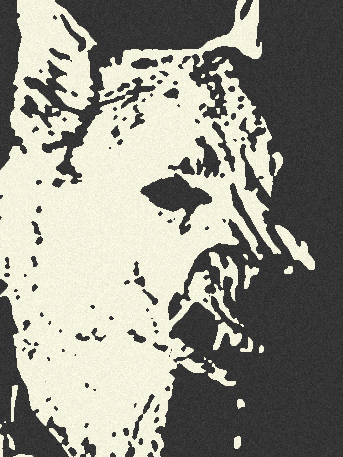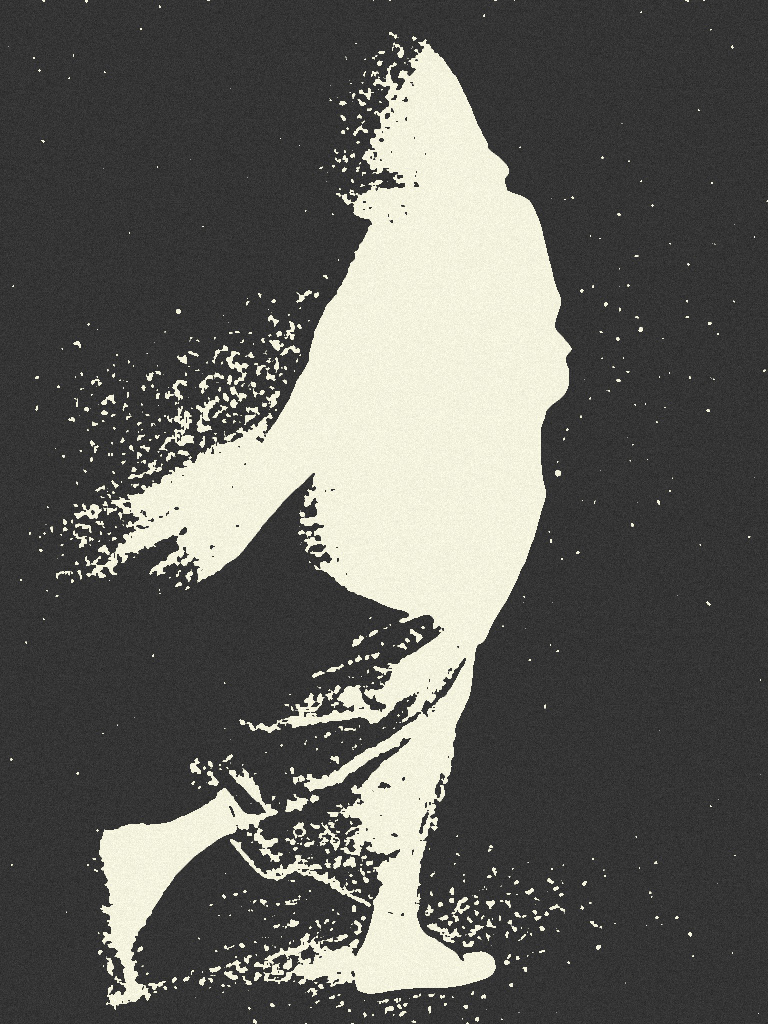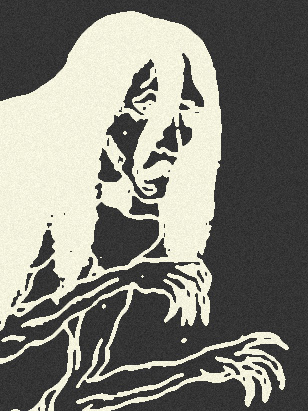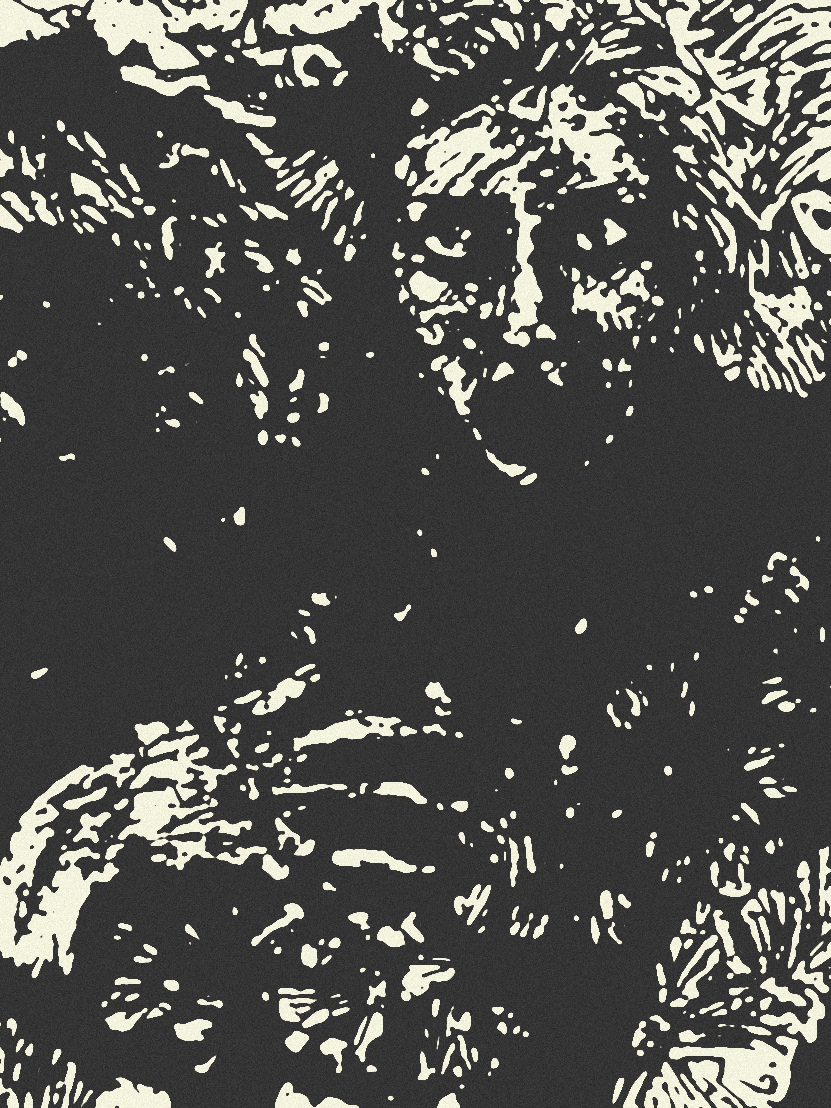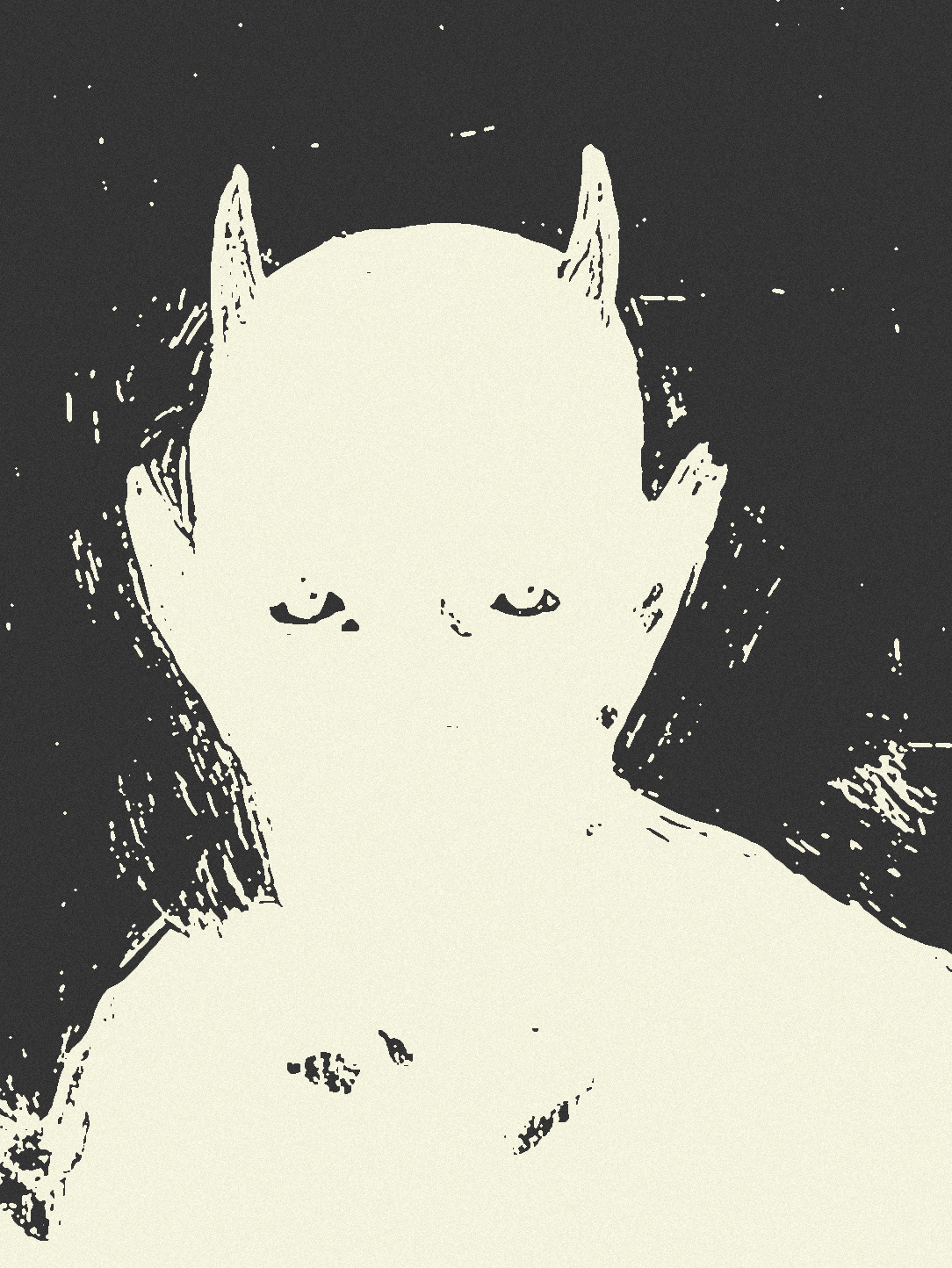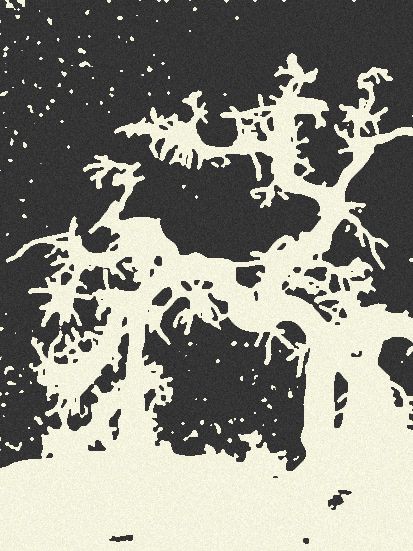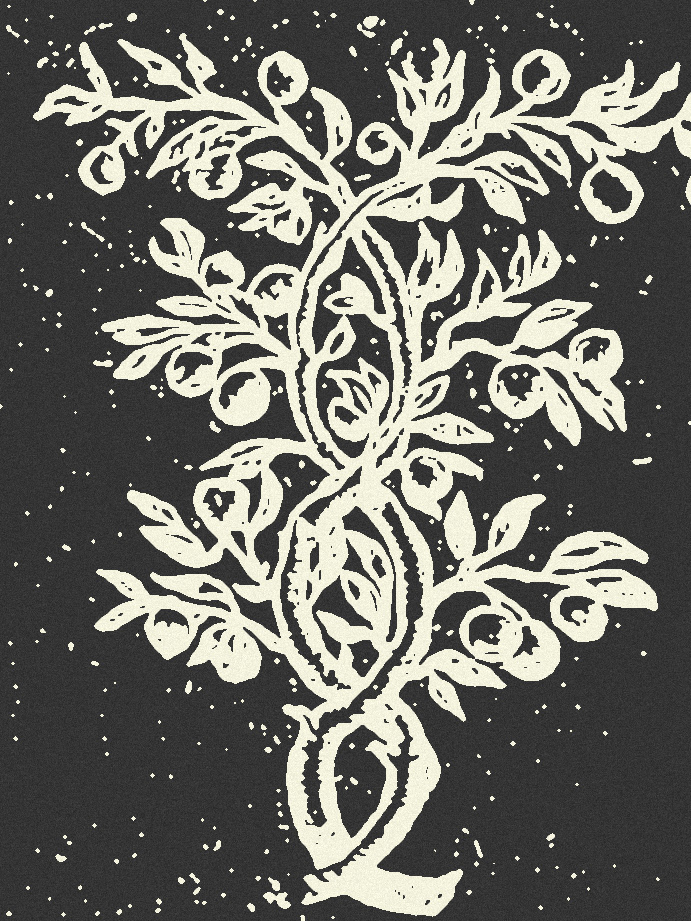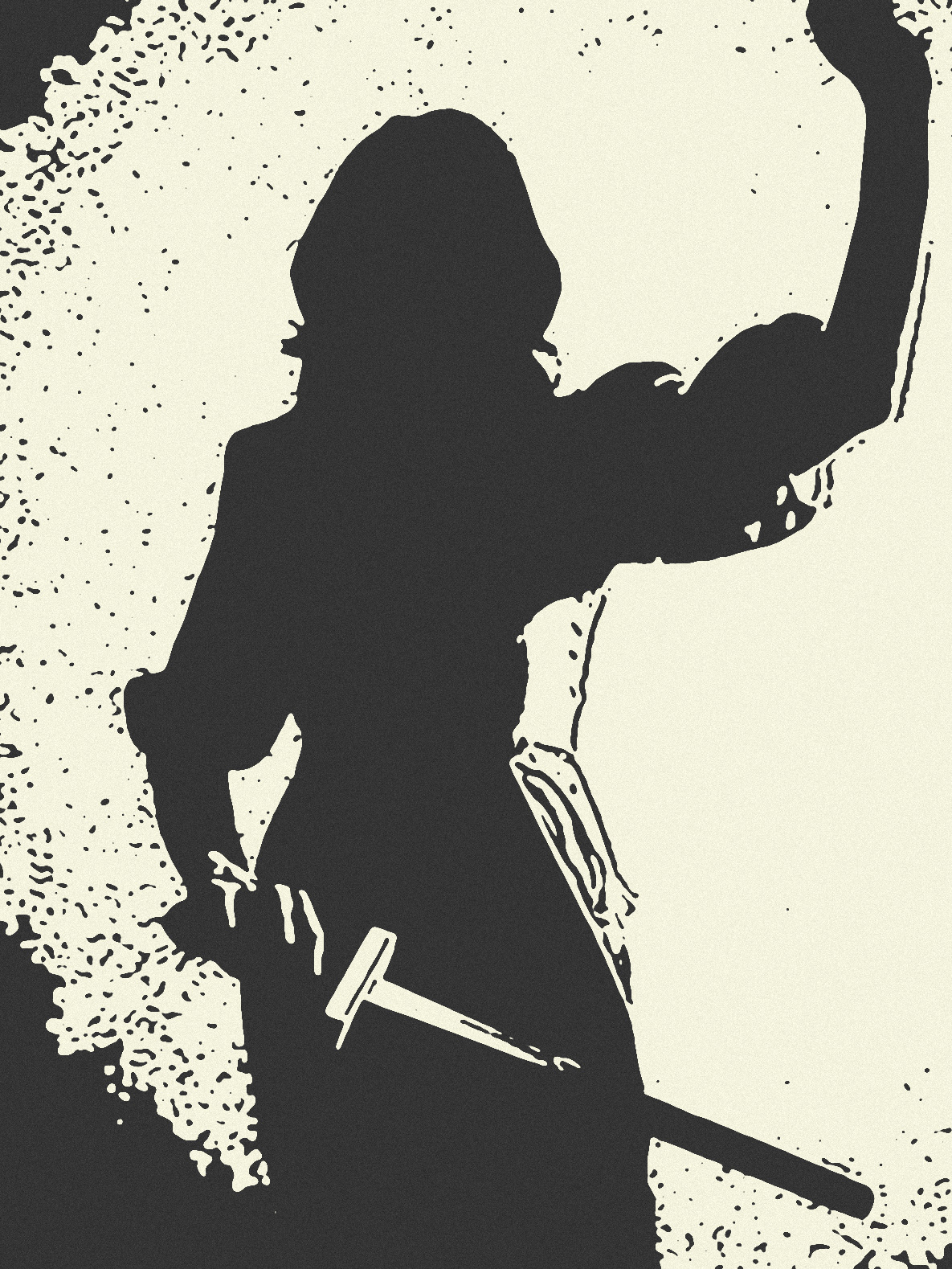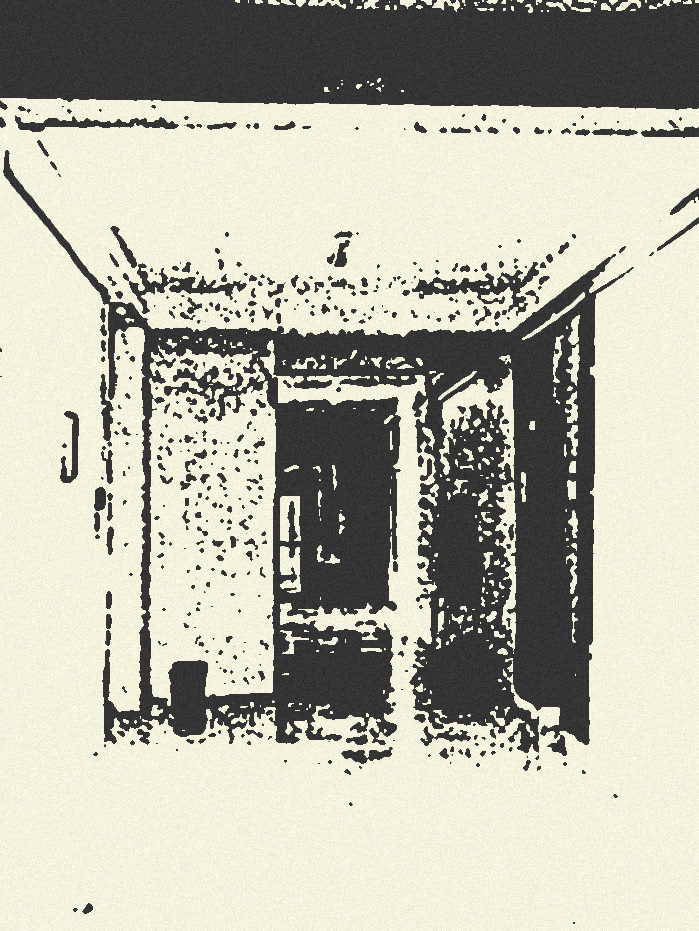✷
“I just don’t want you to get hurt,” Linda said, wiping at her nose with a soggy, crumpled tissue. “I’m worried about you.”
I extended my eye stalks toward her, giving her what I hoped was a look of indignation. I couldn’t believe she was trying to spin it like it was my fault. “If you didn’t want me to get hurt, maybe you shouldn’t have been so quick to deploy the chemical weapons.”
She waved her tissue with a dismissive gesture. “It’s just a little salt.”
My eye stalks retracted reflexively, reacting to the mere mention of the word. “Right. And Vietnam was ‘just a little napalm.’” I slid off the chair’s seat, down the leg, and onto the cold tile floor, traveling on a thin layer of slime toward the phone on the wall.
“Where are you going?” Linda asked.
“To call my boss.”
“To tell him what?”
“Well, I guess I’m not going to work today, am I? Unless you plan on sweeping up this mess.” I jabbed one of my eye stalks at the wide circle of salt she had poured on the kitchen floor around me. “Now I’ve gotta get someone else to handle the Rosenberg account.”
“You were going to go like that?” Linda cocked a skeptical eyebrow and motioned to my limbless body.
I hesitated, caught in a lie. “Maybe.” Avoiding Linda’s glare, I slithered up the wall to the phone and jabbed at the speakerphone button with one of the short feelers on the bottom of my face. A loud dial tone filled the kitchen.
Linda watched me struggle to negotiate the dial pad for a few moments before asking, “Do you want me to dial that for you?”
“If you wouldn’t mind.”
She stood with a beleaguered sigh and began to lumber across the kitchen. Suddenly, her bare foot slipped in the trail of clear slime I had left on the floor, sending her reeling backward. Her head hit the edge of the counter with a sickening crack, then smashed onto the tile with a dull, wet thud. A dark pool of blood began spreading under her cheek. Her eyes stared at the baseboard under the dishwasher, wide and unseeing.
“Linda?” My voice was barely a whisper. “Babe?”
With a quick poke of my feeler, I turned off the speakerphone, ending the incessant drone of the dial tone. The silence was suffocating. A cold wave of fear rippled along my mottled flesh. Air whistled in and out of my breathing pore as I struggled to contain my panic.
I called her name again, louder this time. “Linda!” No response.
With a grunt, I peeled myself off the wall and flipped end-over-end onto the kitchen floor, landing on my back with a splat. Then I rolled over and wriggled toward Linda, undulating along the floor as fast as my slug body could take me. Which, admittedly, wasn’t very fast. It didn’t matter, though. There was no saving her. She was dead.
If I had been in my normal human body, I would have wept over my wife’s lifeless corpse. But in my current form, the best I could do was allow my eye stalks to droop in a grim facsimile of grief. I couldn’t let myself cry—the salt from the tears would melt my face off.
Once my initial shock subsided, I looked around the kitchen to assess my situation. The salt circle Linda had poured on the floor was intended to keep me from leaving the house and potentially alerting the neighbors to my unusual condition. What is my condition, you ask? It’s sort of like … you know how, when the moon is full, a person will turn into a werewolf? Well, it’s like that, except instead of a werewolf, I turn into a slug. And instead of a full moon, it’s triggered by 8 a.m. morning meetings.
I highly doubted anybody in the neighborhood would recognize me in slug form, but Linda was adamant that my affliction should remain a secret. She didn’t want to raise any suspicions with the Homeowner’s Association or, more importantly, the Garden Club. They had a particular aversion to any invasive species that might threaten their precious tomato plants.
The salt circle was a devious trap. Any contact with the salt would send me into writhing paroxysms of agony—it was like being burned alive by a million scorching cinders—so I was stuck inside the circle until I reverted into human form. The problem was, I had no idea how long that would take. Sometimes, it was only a few hours before I awoke naked and covered in slime somewhere in our house. Other times, I stayed transformed for days, subsisting on a bland diet of spring mix and kale until my limbs and head regrew enough for me to make a ham sandwich.
My options for getting rid of the salt were limited. I had no arms, so I couldn’t properly operate a broom. I could theoretically summon the Roomba from the living room via the mobile app on Linda’s smartphone, but there was no guarantee that the robot vacuum would effectively sweep up the salt—it was just as likely to smear it around the kitchen, turning the whole room into a toxic wasteland. I could try to do something dramatic like dropping from the table on top of the Roomba and riding it out of the kitchen like a hovercraft, but that plan was fraught with peril. If I misjudged the drop, I could be sucked under the thing and sliced into sushi by the vacuum’s whirling brushes.
I cleared my thoughts and tried to go back to basics. What would I do in this situation if I wasn’t a slug? I’d dial 911, of course. And then … what, exactly? The paramedics’ emergency training probably didn’t explain how to handle a call from a talking gastropod. Best case, they’d pick me up and fling me into the garden. Worst case, they’d drop me into the garbage disposal. Or worst-worst case, they’d pour salt on me themselves, just to see me squirm.
I looked at Linda’s body again. Her mouth hung open, a thin trail of drool leaking from the corner of her lips and onto the floor. The way the saliva glistened in the early morning light reminded me of my own slime trail. Then it hit me. Yes! That’s it! I could dial 911, then—in the time it took for the ambulance to arrive—I could slither down the wall, across the kitchen floor, and into Linda’s mouth. After the paramedics forced their way into the house, they would put Linda on a stretcher and would carry her out to the ambulance, with me along for the ride like a stowaway in the wheel well of a passenger jet. Once outside, I could squirm out of her mouth and drop to the grass, where I would wait until I returned to human form. It was a perfect plan. Absolutely foolproof.
Or so I thought.
The first part of the plan went flawlessly. I crawled back up the wall to the phone, activated the speaker, then clumsily dialed 911 with my feelers. Once the operator answered, I explained that my wife had fallen in the kitchen and had hit her head on the counter. “I think she might be dead,” I said. I told the operator our address. She said help was on the way.
After ending the call, I dropped back to the floor and squirmed over to Linda’s body, avoiding the pool of blood that was congealing around her head like a grisly halo. I paused to give her a small peck on the bottom lip, then slipped into the moist darkness of her mouth. The inside of her cheek was velvety and warm under my belly. The air within was malodorous—I could smell the remnants of hard-boiled egg still stuck in the ridges of her molars and the gaps between her teeth—but it was tolerable enough under the circumstances. I curled into a small loop, rested my head on my tail, and waited for the ambulance to arrive.
Within a few minutes, the doorbell rang, followed by loud pounding and muffled calls from outside. When nobody answered, the first responders circled the house looking for an alternate entrance. Hurried footsteps shuffled up the sidewalk to the house’s side door, which opened into the kitchen just a few feet from Linda’s body. “She’s in there!” someone shouted. There was more knocking, more shouting. Finally, glass shattered and tinkled to the floor as one of the paramedics smashed out a window panel in the kitchen door and reached through to turn the doorknob.
I felt a wave of relief as the paramedics entered the room. My plan was working; I was almost free of the salt circle. All I had to do was wait for them to load Linda onto a stretcher and carry her out of the house.
Unfortunately, that’s not what happened.
I probably should have anticipated that they’d try CPR. It was obvious, in retrospect—they wouldn’t want Linda’s brain to be deprived of oxygen for any longer than necessary. And what’s the first step of CPR? That’s right: mouth-to-mouth resuscitation.
First, a paramedic rolled Linda onto her back and tilted her chin up toward the ceiling. The inside of her cheek sagged a bit, creating a wide pocket of space next to her back teeth. I rolled into the gap, narrowly avoiding a pair of gloved fingers as they adjusted my wife’s tongue to clear her airway.
The next thing I knew, I was being blasted by a hot wind that stank of coffee and stale cigarettes. I closed my breathing pore as much as I could, but I was too late to avoid getting a lungful of the paramedic’s rank air as he breathed into Linda’s mouth. The temperature cooled momentarily while he drew away to apply chest compressions. Each pump of his hands on Linda’s breastbone rocked her body like a miniature earthquake. Short blasts of sulfurous egg-tinged air escaped from her lungs with each successive compression, further befouling the atmosphere in her mouth. Then the paramedic’s fetid breath returned. This cycle repeated itself several times before the guy asked, “Anything?”
“Still no pulse,” a different voice responded.
“All right. Charge the defib.”
Horror rippled down the length of my body as I realized what he meant: defib was short for defibrillator. They were going to shock my wife back to life, to jumpstart her stalled heart with a jolt of electricity. And I was inside of her body.
A high-pitched whine filled the room: the sound of the defibrillator charging. I tried to call out, to beg them to stop, but I couldn’t produce a sound. Instead, I heard the paramedic speak the word I feared was coming.
“Clear!”
My nerve endings exploded with white-hot pain as the electricity from the defibrillator surged through Linda’s body and into mine. Every muscle seized, causing my long, soft form to go as straight and rigid as a finger. I made a noise that sounded like “Hnnnngg!”
“Still no pulse. Hit her again.”
“All right. Clear!”
“Hnnnngg!” Intense pain. Searing heat. Blinding light. I writhed and twisted in Linda’s mouth, trying to stretch myself toward the narrow seam of brightness between her lips. I had to get out before the paramedics shocked her again.
“Jesus fuck! What the hell is that?” I heard the clatter of the defibrillator paddles being dropped on the floor.
“What?”
“In her mouth! It looks like—”
“Is that a hand?”
A hand? I thought, momentarily confused. I rotated my eye stalks to look down the length of my body. Sure enough, a small, perfectly formed human hand was protruding from my side. I watched in horror as it grew larger, extending further from my body, giving way to a wrist, then a forearm. The hand breached Linda’s lips, forcing her mouth open and reaching out into the open air of the kitchen as it continued to grow: elbow … bicep … shoulder. At the same time, another hand materialized from the other side, forced outward by the rapidly-growing arm emerging from my mantle. It too stretched out of Linda’s mouth.
I squinted against the sudden brightness of the sunlight flooding in through my wife’s now-gaping maw. I could only imagine what it looked like from the paramedics’ point of view: a giant slug with human arms crawling from a dead woman’s mouth like some kind of obscene oral birth.
My transition back to human form was happening quickly, triggered and accelerated by the shock of the defibrillator. The girth of my body rapidly increased, dislocating Linda’s jaw and causing it to open wider than should’ve been humanly possible. I could feel her teeth pressing into my flesh, threatening to puncture my fragile skin.
As my face emerged from Linda’s mouth, I was able to see the paramedics for the first time. One was a muscular young man in his early twenties. The tag on his shirt identified him as Charlie. The other was an older man in his mid-forties named Frank. Frank was on his knees next to Linda’s body—he was the one doing mouth-to-mouth and wielding the defibrillator paddles. Charlie squatted nearby with the main defibrillator pack in his hands.
My eye stalks slowly retracted until my eyeballs were seated in the sockets of my hardening skull, perched over a partially-formed human nose and a writhing slug mouth. At the sight of my malformed head—half slug, half human—Charlie’s face turned the color of old newspaper. He made a strangled gagging sound, then dropped the defib pack and bolted out the kitchen door.
“Whaaaat the fuck?” Frank exclaimed. He backpedaled away from me, his boots slipping in the blood from Linda’s head and smearing it in big, bold streaks on the tile. Then he reached up, grabbed the edge of the counter, pulled himself to his feet, and followed Charlie out the door.
With the paramedics gone, I dragged my flaccid body out of Linda’s mouth, slipping out onto the floor just as my legs began to grow back. The return to human form was relatively quick; the transition to full human size took longer. At first, I looked like a tiny homunculus—a perfectly-formed human the size of a small squirrel and the color of caramel candy. From there, my body grew proportionally until it was back to its original size: about 5’ 9", 200 pounds or so. The slime dried, returning my skin to its original texture and color. Within a few minutes, I was myself again. I was naked. I was cold. But I was me.
I stood up on shaky legs and looked down at my wife’s body. Her mouth was torn wide open, with her lower jaw hanging down almost to her collarbone. Her eyes stared vacantly up at me. The defibrillator was on the floor next to the body, along with a large duffel bag full of medical supplies that the paramedics had left behind. The salt circle was broken, with a spray of tiny white crystals scattered across the floor from where the paramedics had entered and exited.
Still numb with shock and exhaustion, I wandered absently over to the utility closet and pulled out a broom, then swept the salt into a dustpan and dumped it into the trash. I felt terrible about what happened to Linda. She didn’t deserve such an undignified death. Yes, I was frustrated about the salt circle, but deep down I knew that she was only trying to protect me. She loved me unconditionally, regardless of how I looked or whether I had bones.
Sirens began to wail in the distance, their volume rising as they drew closer. The paramedics had called the cops, an understandable reaction after what they had seen. I went into the bedroom and slipped on a pair of pants, then returned to the kitchen to wait for the police. Not surprisingly, they arrested me under suspicion for the murder of my wife. After photographing and fingerprinting me, they locked me in the county jail pending my arraignment, which was scheduled for 8 a.m. the next morning.
They never understood how I escaped. There was no sign of forced exit, no evidence of foul play. The only thing they found was a thin trail of slime leading between the bars, out through the front door, and into the grass outside.
✷
"The Salt Circle" originally appeared in The Literary Hatchet.
Warren Benedetto writes dark fiction about horrible people, horrible places, and horrible things. He is an award-winning author who has published over 200 stories, appearing in publications such as Dark Matter Magazine, Fantasy Magazine, and The Dread Machine; on podcasts such as The NoSleep Podcast, Tales to Terrify, and Chilling Tales For Dark Nights; and in anthologies from Apex Magazine, Tenebrous Press, Scare Street, and many more. He also works in the video game industry, where he holds 35+ patents for various types of gaming technology. For more information, visit warrenbenedetto.com and follow @warrenbenedetto on Twitter and Instagram.

